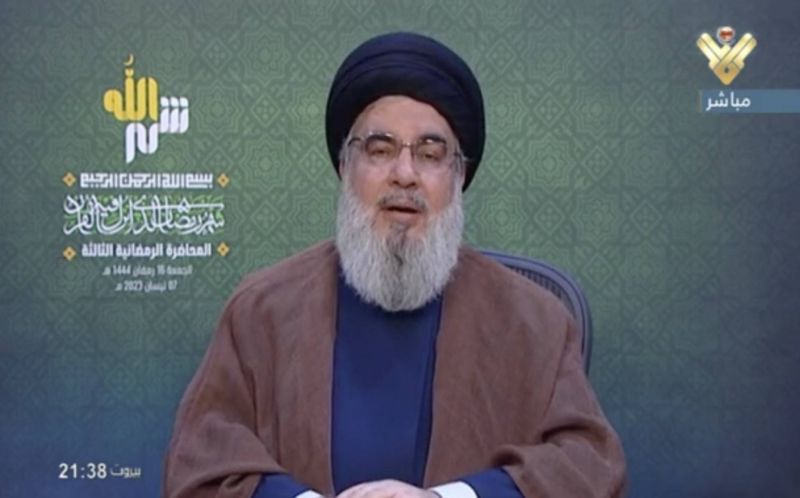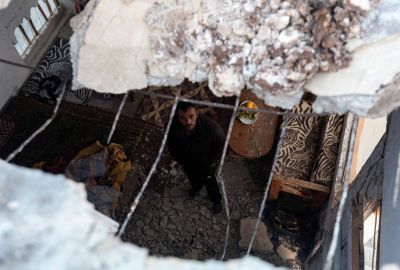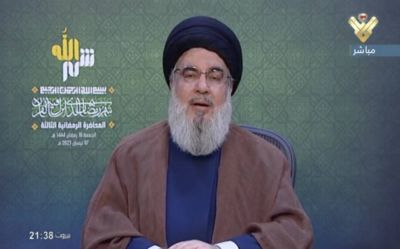
Hezbollah's leader Hassan Nasrallah speaks during a live televised speech on April 7, 2023. (Credit: Al-Manar/Screenshot)
Hezbollah Secretary-General Hassan Nasrallah announced Friday evening that he would refrain from commenting on "what happened in southern Lebanon," in his first televised appearance since rocket fire from southern Lebanon into Israel on Thursday was met by retaliatory airstrikes by Israel before dawn on Friday morning. The Hezbollah leader said, however, that he will address these developments in a speech scheduled for next Friday.
"Given what happened yesterday in South Lebanon, Jerusalem, the West Bank and Syria, given that it is the same cause, I will not have enough time to discuss this tonight in detail, but I will leave this issue for a speech scheduled for next Friday on the occasion of International al-Quds [Jerusalem] Day," the Hezbollah chief said in a religious speech delivered on the occasion of Ramadan.
On Thursday, the day of the Jewish Passover, dozens of rockets were fired from Lebanon into Israel, injuring one person and causing material damage.
These rocket fire came a day after Israeli police stormed the Al-Aqsa mosque in Jerusalem, the third holiest site in Islam, to dislodge Palestinians who had barricaded themselves there.
In response to the rocket fire, Israel launched airstrikes on Friday before dawn in southern Lebanon and the Gaza Strip, saying it was targeting positions of the Palestinian movement Hamas. The air raids began shortly before midnight in Gaza and lasted several hours, while the bombing of southern Lebanon was brief and occurred around 4 a.m. (local time) Friday. The Israeli army claimed to have struck three "infrastructure" targets belonging to Hamas in the Rashidieh area, where there is a Palestinian refugee camp, near Sour.
By Friday morning, the situation had returned to normal in southern Lebanon, and a precarious calm prevailed in the areas affected by the strikes. But in the early evening, Israel announced that it had shot down a drone that had penetrated its territory from Lebanon, a few hours before Hassan Nasrallah's speech.
This is the first time Israel has confirmed that it has attacked Lebanese territory since April 2022. The strikes are the latest episode in a sudden rise in tension in the Middle East since Wednesday, after a relative lull in the Israeli-Palestinian conflict observed since the beginning of Ramadan on March 23. The strikes also constitute an escalation on the Israeli-Lebanese front not seen since 2006.
Reacting to these incidents, Hezbollah Deputy Secretary-General Naim Qassem said Friday that "the entire axis of resistance remains vigilant."
Lebanon's Foreign Ministry assured for its part that the country wants to preserve "calm and stability" in the south and called on the international community to "pressure Israel to stop the escalation."
The ministry also issued a statement saying Lebanon will file a complaint with the UN Security Council over the Israeli strikes.
For its part, UNIFIL, the UN peacekeeping force in Lebanon, announced on Friday that it has opened an investigation into the "rocket fire and air attacks that occurred yesterday and early today."
Coexistence and dialogue
In his speech, Nasrallah also addressed several domestic Lebanese issues, including the ongoing presidential vacuum that has persisted since Oct. 31, with the country's MPs failing at 11 separate attempts to elect a successor to Michel Aoun.
Nasrallah also commented on the attempted monthlong postponement of the changeover to daylight saving time, which quickly took on a sectarian dimension in Lebanon before caretaker Prime Minister Najib Mikati reversed his decision following widespread outcry and administrative chaos. On the topic, Nasrallah said, "We should not say anything inappropriate, even if we are angry. We must contain our anger."
"In this country, our choice is to live together. This small country cannot stand federalism or division," the Hezbollah leader went on. "People must live together despite political differences," he added. "After the Civil War, in the end, the Lebanese were forced ... to live together," he said.
"Any political dispute is temporary and can be resolved," Nasrallah also said.
His words come as Lebanese MPs remain divided over the choice of a presidential candidate. Hezbollah and Amal recently formalized their support for the leader of the Marada Movement, Sleiman Frangieh. However, Frangieh faces the veto of two major Christian parties, the Lebanese Forces (LF) and the Free Patriotic Movement (FPM), whose relations with Hezbollah have recently become strained.

